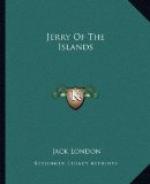Van Horn had had no intention of going ashore, and that he went ashore at the black chief’s insolent challenge was merely a matter of business. For an hour he strolled about, his right hand never far from the butt of the automatic that lay along his groin, his eyes never too far from the unwilling Nau-hau beside him. For Nau-hau, in sullen volcanic rage, was ripe to erupt at the slightest opportunity. And, so strolling, Van Horn was given to see what few white men have seen, for Langa-Langa and her sister islets, beautiful beads strung along the lee coast of Malaita, were as unique as they were unexplored.
Originally these islets had been mere sand-banks and coral reefs awash in the sea or shallowly covered by the sea. Only a hunted, wretched creature, enduring incredible hardship, could have eked out a miserable existence upon them. But such hunted, wretched creatures, survivors of village massacres, escapes from the wrath of chiefs and from the long-pig fate of the cooking-pot, did come, and did endure. They, who knew only the bush, learned the salt water and developed the salt-water-man breed. They learned the ways of the fish and the shell-fish, and they invented hooks and lines, nets and fish-traps, and all the diverse cunning ways by which swimming meat can be garnered from the shifting, unstable sea.
Such refugees stole women from the mainland, and increased and multiplied. With herculean labour, under the burning sun, they conquered the sea. They walled the confines of their coral reefs and sand-banks with coral-rock stolen from the mainland on dark nights. Fine masonry, without mortar or cutting chisel, they builded to withstand the ocean surge. Likewise stolen from the mainland, as mice steal from human habitations when humans sleep, they stole canoe-loads, and millions of canoe-loads, of fat, rich soil.
Generations and centuries passed, and, behold, in place of naked sandbanks half awash were walled citadels, perforated with launching-ways for the long canoes, protected against the mainland by the lagoons that were to them their narrow seas. Coconut palms, banana trees, and lofty breadfruit trees gave food and sun-shelter. Their gardens prospered. Their long, lean war-canoes ravaged the coasts and visited vengeance for their forefathers upon the descendants of them that had persecuted and desired to eat.
Like the refugees and renegades who slunk away in the salt marshes of the Adriatic and builded the palaces of powerful Venice on her deep-sunk piles, so these wretched hunted blacks builded power until they became masters of the mainland, controlling traffic and trade-routes, compelling the bushmen for ever after to remain in the bush and never to dare attempt the salt-water.
And here, amidst the fat success and insolence of the sea-people, Van Horn swaggered his way, taking his chance, incapable of believing that he might swiftly die, knowing that he was building good future business in the matter of recruiting labour for the plantations of other adventuring white men on far islands who dared only less greatly than he.




